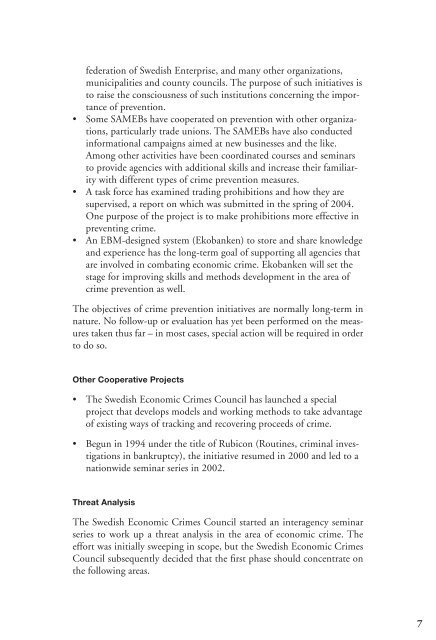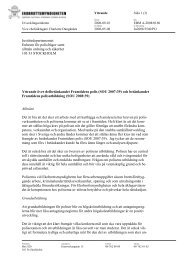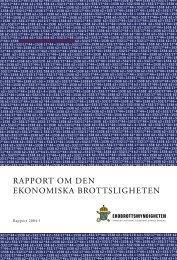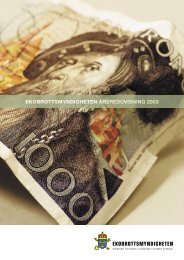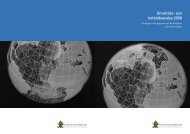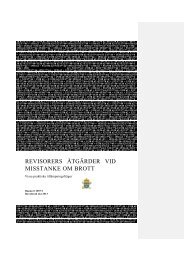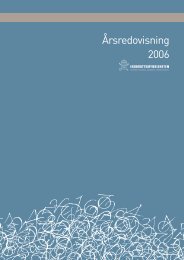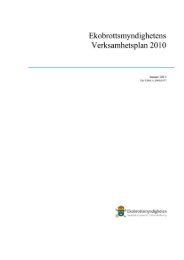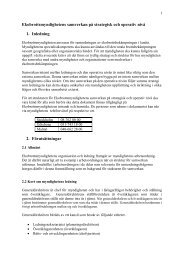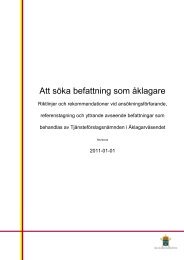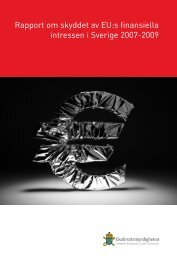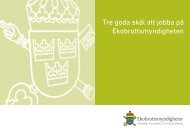Economic crime report 2004 - Ekobrottsmyndigheten
Economic crime report 2004 - Ekobrottsmyndigheten
Economic crime report 2004 - Ekobrottsmyndigheten
You also want an ePaper? Increase the reach of your titles
YUMPU automatically turns print PDFs into web optimized ePapers that Google loves.
federation of Swedish Enterprise, and many other organizations,<br />
municipalities and county councils. The purpose of such initiatives is<br />
to raise the consciousness of such institutions concerning the importance<br />
of prevention.<br />
• Some SAMEBs have cooperated on prevention with other organizations,<br />
particularly trade unions. The SAMEBs have also conducted<br />
informational campaigns aimed at new businesses and the like.<br />
Among other activities have been coordinated courses and seminars<br />
to provide agencies with additional skills and increase their familiarity<br />
with different types of <strong>crime</strong> prevention measures.<br />
• A task force has examined trading prohibitions and how they are<br />
supervised, a <strong>report</strong> on which was submitted in the spring of <strong>2004</strong>.<br />
One purpose of the project is to make prohibitions more effective in<br />
preventing <strong>crime</strong>.<br />
• An EBM-designed system (Ekobanken) to store and share knowledge<br />
and experience has the long-term goal of supporting all agencies that<br />
are involved in combating economic <strong>crime</strong>. Ekobanken will set the<br />
stage for improving skills and methods development in the area of<br />
<strong>crime</strong> prevention as well.<br />
The objectives of <strong>crime</strong> prevention initiatives are normally long-term in<br />
nature. No follow-up or evaluation has yet been performed on the measures<br />
taken thus far – in most cases, special action will be required in order<br />
to do so.<br />
Other Cooperative Projects<br />
• The Swedish <strong>Economic</strong> Crimes Council has launched a special<br />
project that develops models and working methods to take advantage<br />
of existing ways of tracking and recovering proceeds of <strong>crime</strong>.<br />
• Begun in 1994 under the title of Rubicon (Routines, criminal investigations<br />
in bankruptcy), the initiative resumed in 2000 and led to a<br />
nationwide seminar series in 2002.<br />
Threat Analysis<br />
The Swedish <strong>Economic</strong> Crimes Council started an interagency seminar<br />
series to work up a threat analysis in the area of economic <strong>crime</strong>. The<br />
effort was initially sweeping in scope, but the Swedish <strong>Economic</strong> Crimes<br />
Council subsequently decided that the first phase should concentrate on<br />
the following areas.<br />
7


